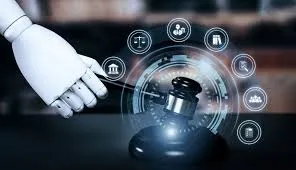A popular refrain echoes through legal technology conferences and webinars: “Lawyers won’t be replaced by AI, but lawyers with AI will replace lawyers without AI.» This statement offers a degree of comfort to legal professionals navigating rapid technological advancement, suggesting AI is primarily an augmentation tool rather than a replacement. While many practitioners hope this holds true, a fundamental question remains: Is it legally possible for AI, operating independently, to replace lawyers under the current regulatory frameworks governing the legal profession? As it stands, the rules surrounding the unauthorized practice of law (UPL) in most jurisdictions present a significant hurdle.
Artificial Intelligence (AI) is becoming more and more prominent in the business world and changing how organisations operate. The legal sector is no exception, with AI being implemented by firms for a number of reasons. Change can often be challenging and can lead to misgivings. It’s natural to ask the question: Will robots replace lawyers? We explore how legal tech and AI are currently used and how the future of the sector is looking.
The Current Situation Of
AI In Law
AI is already present in the legal sector and is becoming increasingly prevalent. The Solicitors Regulation Authority (SRA) reported “Three quarters of the largest solicitors’ firms were using AI” at the end of 2022, which was almost twice the amount reported three years previous. It also found at least 60% of large firms and a third of medium sized firms were exploring the potential of AI.
Currently, AI is used in a variety of ways. Some firms may use an AI powered chatbot on their website or to automate call handling as a first point of contact for clients. However, much of AIs current use is focused on supporting the work of legal professionals by automating repetitive tasks, streamlining processes by generating contracts, managing firm finances and supporting legal research.
AI is already used to support legal research and there are already a number of successful tools used in the sector which use machine learning and natural language processing (NLP). Because these tools can scan thousands upon thousands of legal documents they can help significantly reduce research time and produce more accurate results. They can also generate trends in data, evaluate legal strategies and even predict the outcome of cases.
Advantages of using AI powered legal research tools
There’s no denying legal research can be time consuming. AI tools can perform these tasks in a fraction of the time, which allows legal professionals to focus on their clients and legal strategies. Because the tools are able to review so much information they may produce more results and discover material which could be missed. It can also identify potential inconsistencies in documents and ensure documentation is legally accurate and compliant.
AI can also help save money and improve accessibility to databases, which could be particularly beneficial for smaller firms.
Disadvantages of AI powered legal research tools
Despite the many advantages, AI powered legal research tools aren’t perfect. Legal work still requires the skills of a legal professional. Lawyers will need to contextualise the research, identify the nuances and adapt the provided results for their current cases. It’s also important to remember that AI can only work with the data it has been provided with. If a database is incomplete for example, then the results could lead to inaccuracies and biases.
There are ethical questions around confidentiality and how AI is used and regulated by the legal profession. There are also concerns lawyers could become over reliant on AI. For example, two lawyers in the USA were fined for submitting fake court citations generated by ChatGPT. This alone highlights that, whilst AI powered research can support legal practice, the skills and knowledge of a human lawyer are still a necessity.
Finally, consider the other side of the coin. If AI can support the legal world, how is it being used by criminals? We have already experienced ‘deepfakes’ and voice imitation. Legal professionals need to consider how criminals can use AI to manipulate and deceive in the future.
Will Robots Replace Lawyers?
There are benefits to AI in legal practice – particularly when used to improve workflow and automate the painstaking, repetitive tasks lawyers might have to undertake. That said, it’s unlikely robots will replace lawyers. Practicing law requires human intelligence and emotion, after all, your clients are human too. AI can’t replace your critical thinking, legal advocacy skills, or the relationship you can build with your clients.
AI has demonstrated remarkable efficiency in handling repetitive and time-consuming legal tasks, such as: Document Review & E-Discovery, wherein AI tools can swiftly scan and analyze large volumes of legal documents, identifying key information and reducing manual workload. AI-driven platforms can provide precise case law and statutory references, significantly improving research efficiency. AI can also detect crucial clauses, flag potential risks, and ensure compliance with legal regulations.
However, despite these advancements, AI cannot replace human lawyers in areas requiring: Negotiation and Mediation, wherein Effective dispute resolution often involves persuasion, empathy, and human intuition, all of which AI lacks. Litigation requires adaptability, argumentation skills, and the ability to assess and respond to human behavior, making AI unsuitable for courtroom representation. AI can analyze data but struggles with abstract thinking, moral considerations, and case-specific nuances.
The legal profession is bound by strict ethical and regulatory frameworks that govern issues like:
Attorney-Client Privilege & Confidentiality, Bias in AI Algorithms and Accountability & Professional Responsibility.
Is AI the future of law?
Rather than replacing lawyers, AI is reshaping the legal profession, requiring professionals to adapt and develop new skills. Instead of viewing AI as a threat, lawyers should leverage AI to enhance their capabilities. AI can handle tedious administrative tasks, allowing legal professionals to focus on high-value responsibilities such as: Client counseling, Negotiation and litigation and Legal strategy and innovation. By integrating AI into daily workflows, lawyers can increase efficiency, improve accuracy, and provide better client services.
Legal professionals must stay updated on AI advancements and understand how to integrate technology into their practice. This involves: Learning about AI-powered legal research tools, Understanding the ethical implications of AI in law, and Participating in legal tech workshops and training programs.
As AI takes over routine legal work, lawyers should focus on skills that AI cannot replicate, such as: Critical Thinking & Problem-Solving – Evaluating complex legal issues and making strategic decisions; Emotional Intelligence – Communicating effectively with clients, understanding their concerns, and offering personalized legal guidance. And Ethical Judgment & Advocacy – Navigating legal dilemmas, ensuring justice, and advocating for clients in court.
While AI is undoubtedly transforming the legal profession by enhancing efficiency, streamlining research, and automating repetitive tasks, it is not poised to replace lawyers entirely. The legal field requires human judgment, ethical reasoning, emotional intelligence, and adaptability—qualities that AI currently lacks. Rather than viewing AI as a competitor, legal professionals should embrace it as a powerful tool to augment their expertise and improve service delivery.
The future of law lies in a balanced integration of AI and human expertise, where technology handles administrative burdens while lawyers focus on strategic thinking, advocacy, and client relationships. By staying informed about AI advancements, developing essential human-centric skills, and advocating for ethical AI use, legal professionals can thrive in an AI-enhanced legal landscape. Ultimately, AI will not replace lawyers, but lawyers who effectively utilize AI will have a significant advantage in the evolving legal industry.
Dr. S.Krishnan is an Associate Professor in Seedling School of Law and Governance, Jaipur National University, Jaipur
Ms. Anushka Singh is a First Year Student of BBALLB (H) in Seedling School of Law and Governance, Jaipur National University, Jaipur.























